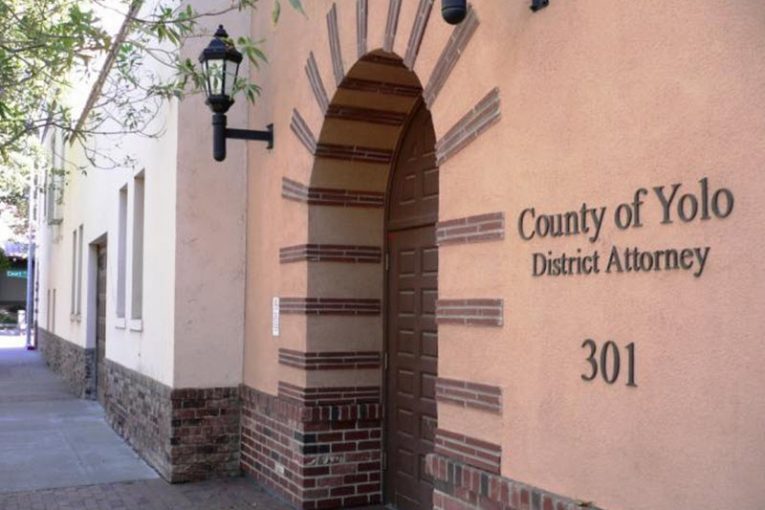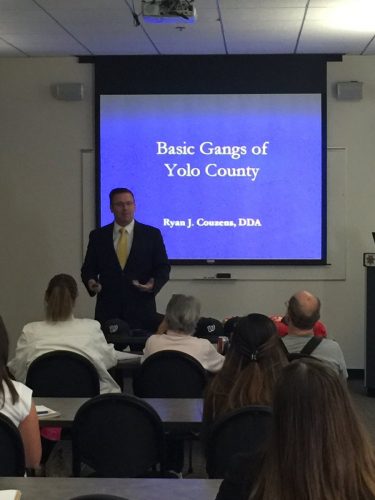

By David M. Greenwald
Woodland, CA – As we swing toward campaign season, the Yolo County DA has been attempting to position himself as a sort of moderate reformer—triangulating between DAs like Sacramento DA Anne Marie Schubert on the hardcore law-and-order side and progressives like Chesa Boudin on the reform side.
The problem that DA Reisig faces is that his rhetoric often doesn’t match his record. Each month, he continues to issue press releases with an ever-rising total of crimes committed by those released on $0 bail—this despite our analysis that their calculations are flawed.
In a release this week as well, a self-described coalition of “citizens and law enforcement” came forward to “urge our legislators and fellow citizens to reject Senate Bill 82 (D-Skinner), which will make all robberies (theft by force or fear) into misdemeanor “petty theft” unless the robber uses a weapon or inflicts great bodily injury (GBI).”
The release had twelve signatories including the California District Attorneys Association, Crime Victims Unit and Assistant Chief Deputy DA of Yolo County, Ryan Couzens.
The group writes: “Under this Bill, a robber may overpower a victim with violence and, as long as the victim suffers only ‘moderate injury,’ no felony robbery will result. By removing the felony consequence, this Bill will encourage thieves to commit robberies, and discounts the physical injury, emotional trauma and financial toll inflicted on victims.”
They continue: “This proposed law is deeply flawed and based on bad analysis. This Bill would, for example, allow a robber to ambush a lone woman in a parking lot or even using an ATM, threaten  her, punch her in the face and wrestle away her purse—and then be charged with a petty theft misdemeanor as long as he inflicts only ‘moderate’ injury.”
her, punch her in the face and wrestle away her purse—and then be charged with a petty theft misdemeanor as long as he inflicts only ‘moderate’ injury.”
In February, Senator Nancy Skinner introduced two reform bills in response to the Penal Code Revision Committee Report—of which she is a member.
The committee was appointed by the Governor and state legislature to comprehensively examine California’s Penal Code and issue recommendations for reforming it. Skinner introduced SB 81 and SB 82.
SB 81 “would reform the state’s use of sentencing enhancements, which add years to prison sentences but, based on widespread research, fail to improve public safety.”
SB 81 “would create a set of guidelines for courts so that sentence enhancements would no longer be applied to nonviolent offenses and certain other cases unless a judge determines that the enhancements are necessary to protect public safety.”
The bill in question, SB 82, “would update a 150-year-old statute that has allowed prosecutors to elevate a petty theft charge into felony robbery.”
SB 82 would establish a clear distinction between theft and robbery for cases when no deadly weapon was used and no one was seriously injured.
“Serving on the Committee on the Revision of the Penal Code gave me the opportunity to engage with experts and advocates to identify commonsense proposals for criminal justice reform.” Sen. Skinner said. “SB 81 sends a clear message to our courts: Sentence enhancements should be used judiciously, and only when the enhancement is necessary to protect the public. And SB 82 will help ensure that in the case of theft, the punishment meets the crime.”
Members of the Penal Code Revision Committee, which included judges, a law school dean, legislators, and others, discussed at length the need to reform California’s 150-year-old robbery statute, because they say “it allows prosecutors to elevate petty theft charges into felony robbery cases. SB 82 was crafted in response.”
“The Penal Code Revision Committee is absolutely correct: Petty theft, like shoplifting, should never be treated as felony robbery,” Sen. Skinner said. “California’s robbery statute hasn’t been updated since 1872. It’s time for us to make sure the punishment is proportionate to the crime committed.”
The office release points out: “Under California’s robbery statute, a person who uses minimal ‘force’ or is perceived to invoke ‘fear’ during a petty theft can be charged and convicted of felony robbery and sentenced to up to five years in prison. The terms ‘force’ and ‘fear’ are often interpreted loosely.”
The problem, however, is “someone accused of having made a verbal threat during a shoplifting incident, even when no force was used and no weapon was involved, can be charged with robbery. Likewise, if the person accused of shoplifting bumps into a store employee or security guard while running out of the store, causing no serious injury, the charge can be elevated to robbery.”
Moreover, there is a racial component here: “Data shows that robbery charges are much more likely when the shoplifter is a person of color. People experiencing a mental health crisis or who have a developmental disability also have a higher likelihood of having their charge include ‘force’ or ‘fear.’”
SB 82 would:
- Create a new category of “petty theft in the first degree” for thefts under $950 that may involve force or fear but do not result in serious injury or involve the use of a deadly weapon. This new category would be punishable by up to one year in jail and/or a $1,000 fine
- Categorize petty theft that does not involve force or fear as “petty theft in the second degree,” which remains punishable by jail time of up to six months and/or $1,000 fine
- Prohibit either category of petty theft from being charged as robbery or burglary
- Apply this change retroactively, allowing those convicted of robbery to apply for resentencing if they meet the criteria.
Couzens and his crew argue, “Making robbery a misdemeanor will increase the number of robberies, particularly by those currently committing petty thefts to support an addiction to drugs.”
Except of course this doesn’t make robbery into a misdemeanor, it changes the definition of what robbery is to fit closer to the notion that robbery involves physical force rather than verbal or implied force.
It is interesting to note that the only named prosecutor on this list is Couzens—who is in a leadership role in the DA’s office. This continues an interesting pattern. When the issue is a matter of reform, such as last month’s event with Measures for Justice in creating a transparency portal, Jeff Reisig puts his name on it.
When it comes to tough on crime measures, like opposing parole or zero bail, it is Assistant Chief Deputy DA Melinda Aiello. When it came to pushing back on SB 1437, it was Ryan Couzens—as it was here. And still other times, it has been Matt DeMoura.
The problem Reisig faces, however, is that his office has basically opposed all legislative efforts to reform the criminal legal system and only comes out with small half-measures—at best—in favor of reform.
—David M. Greenwald reporting
To sign up for our new newsletter – Everyday Injustice – https://tinyurl.com/yyultcf9
Support our work – to become a sustaining at $5 – $10- $25 per month hit the link:

This article needs a complex flow chart to follow!
Isn’t that like arguing that emotional abuse isn’t all that harmful compared to physical abuse?
If I’m following this – the C guy is arguing against the Skinner reform because the reform could result in lower sentences for robbers who don’t use physical force by some definition, but the boss put their name on the reform because it was reform, but DG is arguing that because there is a racial component to sentencing this enhancement should be trashed.
My view: if someone intimidates someone, they are using their ability to scare someone with their threat of physical force using their body — therefore their body is the weapon. Throw the book at them.
While not a chart, this is what the law calls for:
SB 82 would:
Am struck with the expansion of rape definitions, to further include “spousal” rape (apparently ‘espoused’ by the VG, and I agree with that), and the subject “reform”, to reduce severity of robbery charges,
In many ways, robbery and rape (including spousal rape) are, by their nature, similar crimes (by no means, the same, for sure)… they both involve ‘taking’, by force/intimidation, something the victim does not desire to be ‘taken’… both can severely traumatize the victim, with effects being long-lasting… both involve bad assertions of ‘power’ by one person, against another…
It will be interesting to see how both pieces of legislation proceed… and whether logic applied, as to “physical force” vs. “verbal and/or implied force” is similar/same.
Time will tell…
An important clarification, unless the article says: “commentary” with my byline (such as this article), the Vanguard merely by reporting or covering something is not “espousing” it.
Given that the next election for YC DA is June ’22, that swing must have long ropes/chains…
Or, are you trying to fashion a “noose” for another type of “swing”, David?
I have no ‘love’, and little respect for the incumbent DA… but really?
I think our legaslators should change the definition of a mile and shortens it so that Californians can get more miles to the gallon! One more thing can you also change the definition of an hour down to 30mins to shorten my working day.
State of California as much more pressing issues to take care of besides this dribble our illustrious legislatures should focus there attention towards spending that $30 billion dollars we have in water bonds and start sticking a shovel in the ground and make some reservoirs and help solve a water problem do something productive it’s either that or the state of California needs to make our legislature part-time ?
Previous article on these bills with additional background: https://davisvanguard.org/2021/03/california-capitol-watch-criminal-justice-reform-bills-pass-first-hurdle/